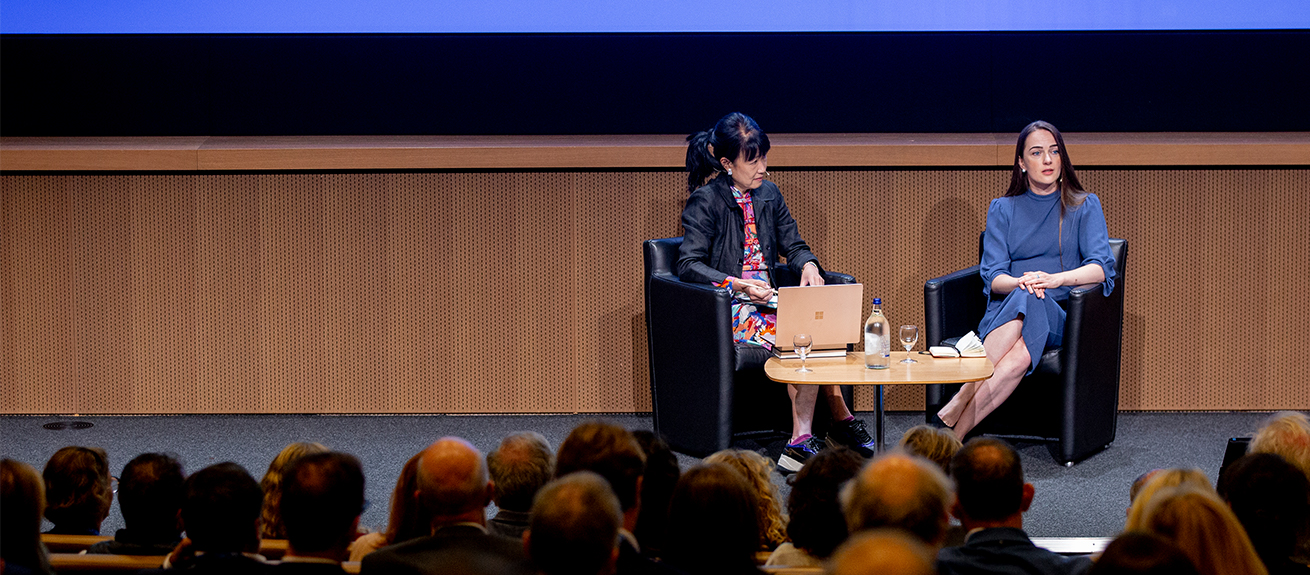IMD welcomed more than 200 alumni back onto its Lausanne campus for its 2023 alumni symposium on the topic of Leadership in the age of ambiguity: Exploring your agency as a global leader in times of turbulence.
This year’s event took place as business leaders contend with increasing sources of uncertainty, from geopolitical tension that is fracturing our globalized world, to climate change, and the rapid advancement of new technologies like generative Artificial Intelligence (AI).
The war in Ukraine is an ever-present crisis and alumni at the event were privileged to hear from Oleksandra Matviichuk, a Ukrainian human rights lawyer and Head of the Center for Civil Liberties (CLL), who said Russia’s invasion of her country had exposed the fragility of international systems.
“When you can’t rely on the international system of peace and security and legal instrument, you can still rely on people,” she said in a moving address, where she shared some examples of the more than 52,000 cases of war crimes the CLL has documented since the invasion.
Matviichuk warned that people living in well-developed countries where citizens relied on the state for protection were “consumers not producers” of democracy.
“They don’t understand its real value. They start to think that freedom is the possibility to make a choice between cheeses in supermarkets. But freedom is very fragile and our world is so interconnected that only the spread of freedom will make our world safer,” she said in conversation with IMD alumna and CEO at Media Trust Su-Mei Thompson.
Western companies are beneficiaries of this system of democracy and human rights, she said, urging business leaders to take responsible, if difficult, decisions.
Globalization in a time of geopolitics
Earlier in the day, Niccolò Pisani, Professor of Strategy and International Business, had presented his research conducted with Simon Evenett from the University of St. Gallen showing that – despite huge pressure from the public and stakeholders – less than 9% of western firms had divested their Russian investments by December 2022.
The findings underscored the complexities and high costs faced by companies, as well as the moral dilemmas involving a firm’s responsibility towards local staff.
This was a point addressed by Magdi Batato, Executive Vice President and Head of Operation for the Nestlé group in his conversation with Michael Watkins, Professor of Leadership and Organizational Change. Nestlé has faced criticism for its continued presence in Russia.
Batato said Nestlé has halted the sale of its international brands and coffee but has continued to sell infant formula and certain types of pet food. “Is it perfect? Maybe not seen by other eyes. What we have thrown into the equation is our 8,000 employees. Because somehow, we owe them something. We cannot simply abandon them as well,” he said.
Pisani highlighted in his session that companies were now more likely to do business in another country based on geopolitical closeness rather than geographic proximity. This “friendshoring” could stoke inflationary pressures because supply chains won’t be built just for efficiency any more.
“For a number of years, geopolitics was mostly relevant for companies in the energy sector or sensitive sectors that clearly had the government as a key player. Right now, pretty much any business is exposed to this,” he said.
A time for courageous humility
The symposium was a moment for alumni to hit pause, to re-connect with friends, and reflect on the insights they heard from fellow alumni and speakers.
“There’s so much wisdom in the world. But are we really taking time to listen as leaders? Are we talking time to care about what our people are saying and are we tapping into their collective experiences and shaping those experiences into meaningful ways forward?” said alumna Michelle Eglin.
This was a theme addressed by Zhike Lei, Professor of Leadership and Organizational Behavior, who said turbulent times called for humble leaders who are able admit the limitations of their own viewpoints and appreciate the strengths and contributions of others.
“Being a humble leader doesn’t mean that everything is fine, you always give encouragement. It also means that you provide a secure base because the goal is for you to play to win; you want to show the highest caring but also the highest daring for your team as well,” she said.
Watkins and Batato also discussed how leaders can build resilience in their teams by sharing examples of past failures and moments of crisis. Another way is by cultivating “robust vulnerability”, where you voice your concerns, and admit you don’t have the answers, but express confidence that together you can collectively figure it out.
Can Artificial Intelligence be a force for good?
With the implications, and applications, of AI top of mind, the symposium also examined the opportunities and threats posed by technology.
Matviichuk expressed her concern that authoritarian regimes and bad actors would use increasingly powerful digital technologies and AI to limit the rights of citizens, describing China’s system of social scoring as a “digital concentration camp.” At the same time, digital technology provides new opportunities for human rights defenders to spread the word and build unions beyond borders.
On the first day of the symposium, IMD’s Chief Learning Innovation Officer Sarah Toms gave alumni an overview of how the institution is already powering executive education with AI, including the creation of its own “ChatGPT”. When building the application, IMD placed a high value on its ethical responsibility, and removed personally identifiable information about participants, she said. “We really are aligned against our North Star, which enables personalized, highly interactive, and deeply engaging learning.”
The initiative is just the latest example of innovation at IMD as it strives to fulfil its purpose to “challenge what is and inspire what could be,” said IMD President Jean-François Manzoni.
Despite the turbulence and ambiguity facing the world, Manzoni stressed his belief that business can be a force for good. “We want to develop leaders and organizations who contribute to a more prosperous, sustainable, and inclusive world.”



